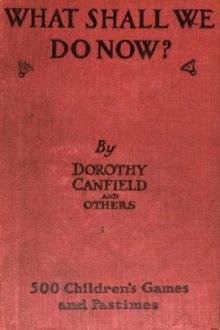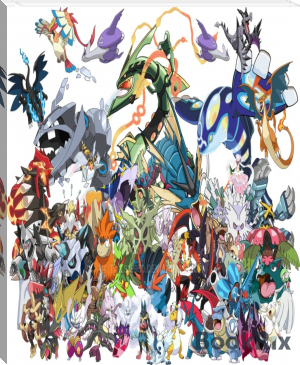What Shall We Do Now? - Dorothy Canfield Fisher (scary books to read .TXT) 📗

- Author: Dorothy Canfield Fisher
- Performer: -
Book online «What Shall We Do Now? - Dorothy Canfield Fisher (scary books to read .TXT) 📗». Author Dorothy Canfield Fisher
Then two of us know the muffin man who lives in Drury Lane.
This done, the second player turns to the third and the same question and answer are given; but when it comes to the comment—
the first player also joins in. At the end therefore, if there are eight people playing, the whole company is singing—
Then eight of us know the muffin man who lives in Drury Lane.
Family Coach.
In "Family Coach" each player takes the name of a part of a coach, as the axle, the door, the box, the reins, the whip, the wheels, the horn; or of some one connected with it, as the driver, the guard, the ostlers, the landlord, the bad-tempered passenger, the cheerful passenger, the passenger who made puns, the old lady with the bundle, and the horses—wheelers and leaders. One player then tells a story about the coach, bringing in as many of these people and things as he can, and as often. Whenever a person or thing represented by a player is mentioned, that player must stand up and turn round. But whenever the coach is mentioned the whole company must stand up and turn round. Otherwise, forfeits. A specimen story is here given as a hint as to the kind of thing needed:—
"There's the railway, of course," said Mr. Burly, "and there's the motor wagonette, and you've all got bicycles; but let's go to London in the old-fashioned way for once; let's go in the Family Coach." These words delighted everybody. "Oh, yes," they all cried, "let's go in the Family Coach." It was therefore arranged, and John the Coachman had orders to get everything ready. This was no light matter, for the Family Coach had not been used for many years, and it would need to be taken to the coachbuilder's at once and be overhauled. So the next morning it lumbered off, and it did not come back for a week; but when it did there was a change indeed. The wheels had been painted red, the axles had been tested, the springs renewed, the inside re-lined, the roof freshly upholstered, and the whole made bright and gay. At last the morning came, a clear, sunny day, and punctually at nine John rattled up to the door. The horses stood there pawing the ground, as if ready to gallop all the way. John had a new coat and hat, and Tim and Peter, the grooms, were also in new livery. Every one was ready. First came Mr. Burly in a wonderful great overcoat, and then Mrs. Burly in furs. Then Uncle Joshua, then Aunt Penelope, and then the three girls and two boys. How they all found room I don't know, but they did. "Are we all ready?" said Mr. Burly. "All ready," said Uncle Joshua. So Tim and Peter sprang away from the horses' heads, crack went the whip, round went the wheels, Uncle Joshua blew the horn, and the old Family Coach was fairly on its journey.
It was a splendid ride. John kept his horses going at a grand pace and hardly used the whip at all, the wheels ran smoothly over the road, and whenever we passed through a village Uncle Joshua blew the horn. We stopped at Thornminster for lunch. John brought us up to the inn door in style, and the landlord came out rubbing his hands and helped Mrs. Burly and Aunt Penelope down with a flourish. "Proud to see you, sir," he said to Mr. Burly. "It is seldom enough that folks travel nowadays in an old Family Coach. I wish there were more of them."
After lunch we went along in the same splendid way until suddenly round a corner came a donkey-cart with the donkey braying at the top of his voice. John pulled the horses well over to the side, but the braying was too much for them, and they rolled into the ditch. In a moment the old Family Coach was overturned. Mr. Burly was shot into the field across the hedge, Uncle Joshua, grasping the horn, landed in a pond, John and Aunt Penelope, Mrs. Burly and the grooms all stuck in the hedge. No one was hurt, but two of the wheels were broken to pieces and one axle was bent, and that was therefore the last of the old Family Coach. So we never got to London in the old way after all.
If this story is not long enough, it can be lengthened. The words in italics are those to be distributed among the company, each player taking more than one if necessary. When the accident comes they might all fall down as they are mentioned. In the case of the wheels and the horses, these may either be taken all four by one player, or eight players may share them. Thus, when the wheels are mentioned, all four players who have taken the wheels would stand up and turn round, and four others when the horses were alluded to.
The Traveler, and the Bicyclist"The Traveler" is a favorite variety of the "Family Coach." In this game a player with a ready tongue is chosen as traveler, and the others are given such names as landlord, bell-boy, clerk, waiter, chambermaid, electric light, elevator, bed, supper, paper, sitting-room, bedroom, steam-radiator, slippers, and so on. The traveler is then supposed to arrive and give his orders. "Can I have a room to-night? Good. And how soon will supper be ready? Ask the bell-boy to take my satchels up to my room. Show me to my room and send up the papers." And so on, each person named having to stand up or be booked for a forfeit.
This game lends itself to various new forms. One might be called "The Bicyclist" and run thus:—A player having been chosen as the bicyclist, the others take as many bicycling names (or two names each might add to the fun) as there are players. Thus—lamp, wick, oil, handle-bars, spokes, tires, chain, pump, nuts, bell, hedges, fields, sheep, roads, hill, dog. This settled, the bicyclist will begin his story, something in this style:—
It looked so fine this morning that I determined to go for a long ride. So I got out the pump and blew up the tires, put the monkey-wrench to a few nuts, filled the lamp, trimmed the wick, polished up the bell and the handle-bars, and started off. The roads were perfect. The fields were shining with dew, the hedges were sweet with honey-suckle, and I skimmed along like the wind until suddenly, at the turn at the foot of Claymore Hill, I rode bang into a flock of sheep and came down with a smash. You never saw such a ruin. The lamp and bell were lost completely, the handle-bars were twisted into corkscrews, the tires were cut to ribbons, the spokes looked like part of a spider's web, my hands and my knees were cut, and the worst of it was that the shepherd's dog mistook me for an enemy and I had to beat him off with the monkey-wrench, until the farmer heard the noise and came to the rescue.
During this story all the players named would, in the ordinary way, stand up for a moment when their adopted names were mentioned, except at the point when the accident occurs, and then every player bearing the name of a part of the bicycle—the handle-bars, spokes, tires, chain, air-pump, lamp, wick, bell, monkey-wrench, pump, nuts—should fall to the ground.
Drawing-Room AcrobaticsThere are various feats which can be performed in a small room without injury to furniture. To lie flat on the floor on one's back and be lifted into an upright position by a pair of hands under the back of the head, keeping stiff all the time, is a favorite accomplishment. Another is to bend over and touch the floor with the tips of the fingers without bending the knees. Another is, keeping your feet behind a line, to see who, by stretching along the ground supported on the left hand only, can place a penny with the right hand the farthest distance and get back again to an upright position behind the line without moving the feet or using the right hand for a support. This done, the penny must be recovered in the same way.
Another feat is, keeping your feet together and one arm behind you, to see how far back from the wall it is possible to place your feet (remembering that you have to get into an upright position again) while you lean forward supported by the other hand laid flat against the wall.
Another is to keep the toes to a line, and kneel down and get up again without using the hands.
Another is to make a bridge of your body from chair to chair, resting the back of your neck on one and your heels on the other. This is done by beginning with three chairs, one under the back, and then when you are rigid enough having the third one removed.
Acrobatic ImpossibilitiesIf you hold your hands across your chest in a straight line with the tips of the forefingers pressed together, it will be impossible for any one else, however strong, to hold by your arms and pull those finger-tips apart.
It is quite safe to stand a person against the wall with his heels touching it, and, laying a shilling on the floor a foot or so is front of him, to say it will be his if he can pick it up without moving his heels from the wall.
Another impossible thing is to stand sideways against the wall with your left cheek, left heel, and left leg touching it, and then raise the right leg.
The Trussed FowlsIn this contest two boys are first trussed. Trussing consists of firmly tying wrists and ankles, bringing the elbows down below the knees and slipping a stick along over one elbow, under both knees and over the other elbow, as in the picture. The game is, for the two fowls to be placed opposite each other with their feet just touching, and for each then to strive to roll the other over with his toes.
Another balancing game. Two boys face each other, each with a candle, one of which is lighted and the other not. Kneeling on the right knee only and keeping the left leg entirely off the ground, they have to make one candle light the other.
Hat and CardsA tall hat is placed in the middle of the room and a pack of cards is dealt out to the players seated round it. The game is to throw the cards one by one into the hat.
Tug of WarThis is properly an outdoor game, but in a big room indoors it is all right. The two sides should be even in numbers, at any rate in the first pull. In the middle of the rope a handkerchief is tied, and three chalk lines a yard apart are made on the floor. The sides then grasp the rope, the captain of each side, whose duty it is to encourage his men by cheering cries, having his hands about a yard and a half from the handkerchief. The rope is then trimmed by the umpire until the handkerchief comes exactly over the middle one of the three lines. On the word being given, each side has to try and pull the rope so that the handkerchief passes over the chalk line nearest





Comments (0)